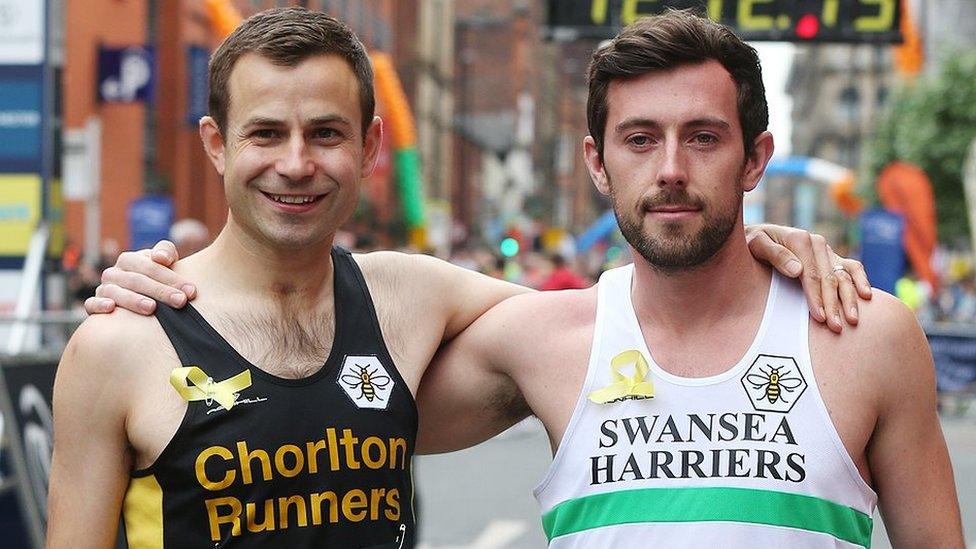What's it like to run the London Marathon slowly?
- Published
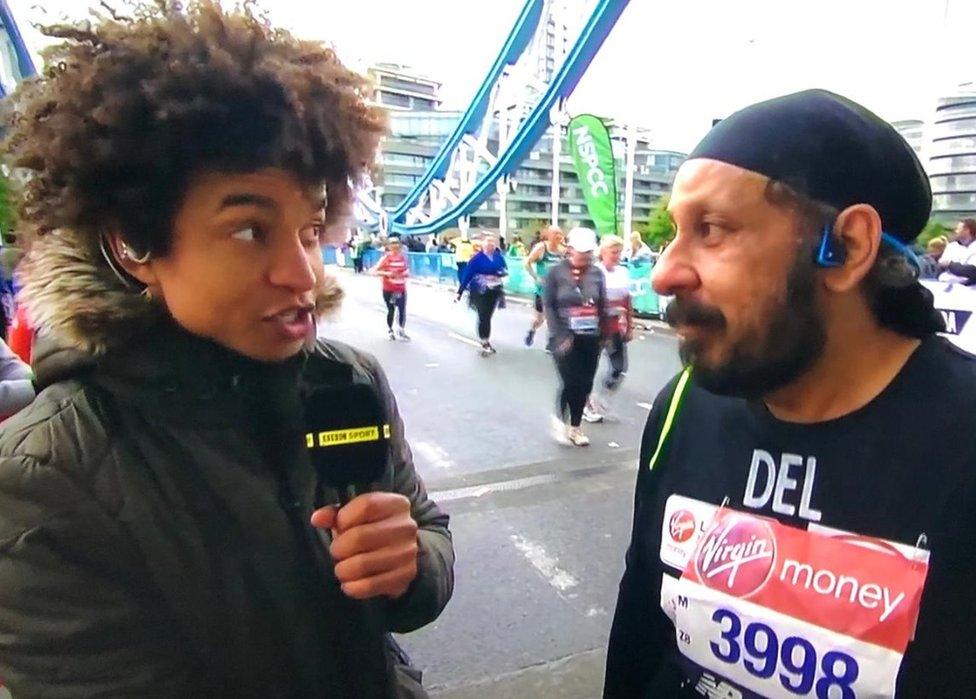
Del Singh was slowed down by a BBC interview - but he didn't mind
Running a marathon is no mean feat. For many people, it is the experience of a lifetime.
While the elite athletes can achieve personal bests (PBs) of between two and three hours, many of those running are happy just to finish.
This was the first year the London Marathon had recruited official pacers to run the course in over six hours.
One of those, Liz Ayres, told the BBC's Victoria Derbyshire programme that, despite running at the requested speed, the clean-up operation had begun around her - and other slow runners had been treated "horrifically".
Some slow runners had mixed opinions about their experience.
Weaving in and out of the public
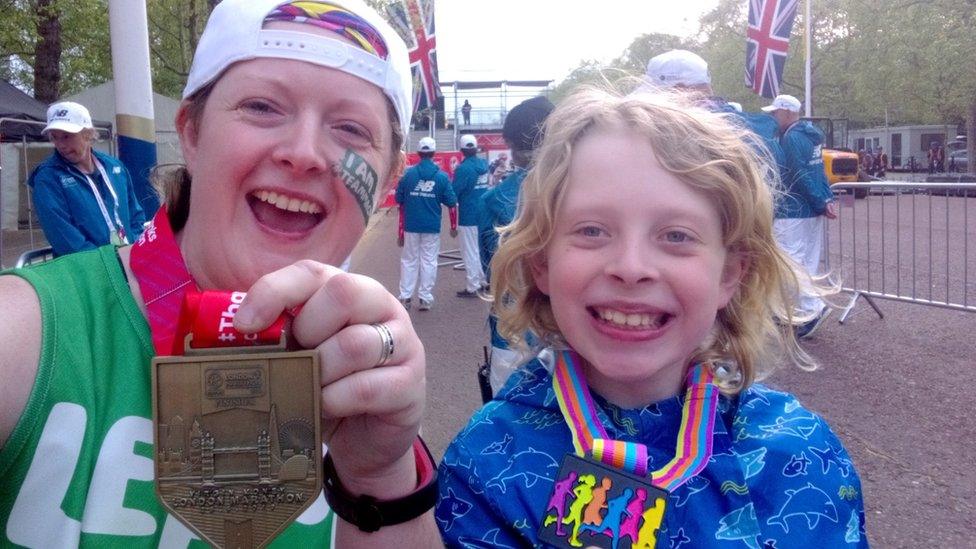
Leanne was happy to have her nine-year-old son cheer her on right at the end
This was 36-year-old Leanne Pilbeam's first marathon. She was very proud to finish in seven hours and 16 minutes, mainly because she was recovering from an injury.
"I started running with the six-and-a-half-hour pacer, staying with her up to Tower Bridge. That experience was amazing," she said.
But as the soreness in her legs caused her to slow down, "the atmosphere wasn't the same".
"It felt almost aggressive," she said.
Just seven hours after the start time, which had been delayed, a car had driven past her, saying the course was now closed, Leanne said.
Next, coaches and sweeper lorries had appeared on the course - and she and her fellow runners had been sprayed by cleaning chemicals.
"They kept telling us to mind out of the way," she said.
"At one stage, we had to go on the path because the road was blocked off.
"We were then weaving in and out of the public.
"It's not quite what I expected."
Water stations had been closed and, Leanne said, she had had to ask a member of the public for a drink.
And, then, as she had crossed the finishing line, she had noticed the infrastructure had already been dismantled.
"It made me feel undervalued," she said. "I thought it would be a great experience. I felt like they only wanted the fast runners.
"What's the point in having the late pacers if they're not going to support the slow runners?"
An awesome experience
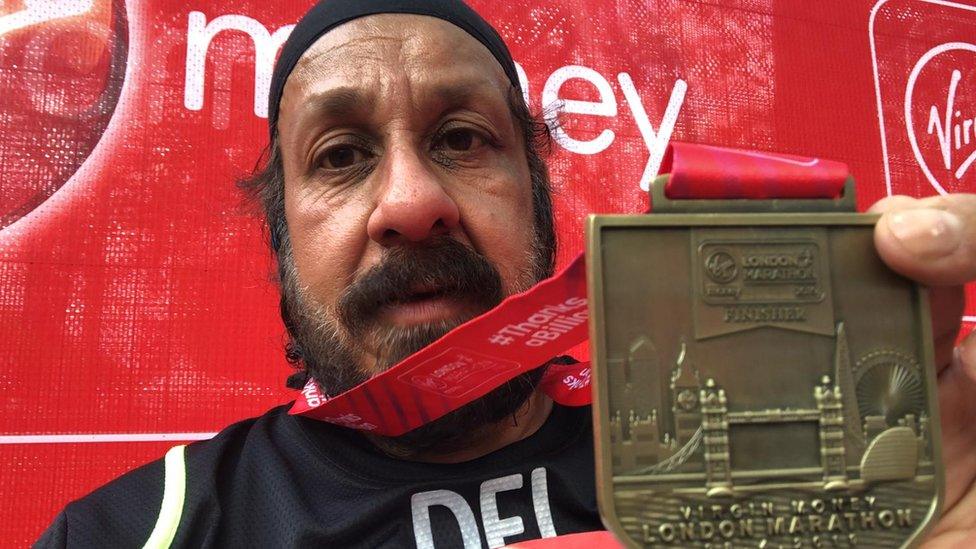
Del Singh with his finisher's medal
Despite having wanted to finish in under seven hours, Del Singh, 56, of Peterborough, was happy with his finish time - seven hours and nine minutes time.
"I've lost 10 stone [63.5kg] in one year, so was happy to get my message across about healthy living when I was stopped by the BBC at Tower Bridge," he said.
Del's only previous marathon run had been Loch Ness Marathon, where, he said, there had been 50 spectators at the start, 50 at the finish and practically no-one cheering en route, so London was totally different for him.
"The crowds were phenomenal. It was an awesome experience," he said.
"I had my name on my T-shirt and crowds were shouting out my name. It was terrific."
At about 23 miles, Del, an IT worker, said he had begun to ask himself: "What have I done?
"But that's when the crowds kicked in. They're the important people carrying people over the line."
Del also had nothing but praise for the marshals and volunteers, whom, he said, had been brilliant.
He too had found the water stations closed and "at about 23 miles a group of us were moved off the pavement but just for about 100 yards".
But, he added: "I didn't hear anyone saying anything derogatory - maybe because I'm quite a big man.
"I'm still large, not so overweight.
"People of all ages and sizes were running the race.
"At least they had the guts to have a go."
Del was sad to hear other slow runners had not had such a happy experience.
"I hope this doesn't put people off from doing it," he said, "but I do think the organisers should look into what happened for some of those people affected."
It felt like we were forgotten about
James Miller, 35, finished in just over eight hours. It was his second marathon and a very different experience from the first, in 2013.
"It was really demotivating to see the course being dismantled around us," he said.
"The worst part was when some of the clocks and timing mats were being taken away.
"I even had to ask directions. It felt like we were forgotten about."
James did not hear any negative remarks being directed towards slow runners.
And although he would like the organisers to rethink the support offered to those finishing late, he added: "I finished outside the pacers' times but the finish line was still open and I was able to collect my medal."
Interviews by Sherie Ryder, BBC UGC and social news
- Published2 May 2019
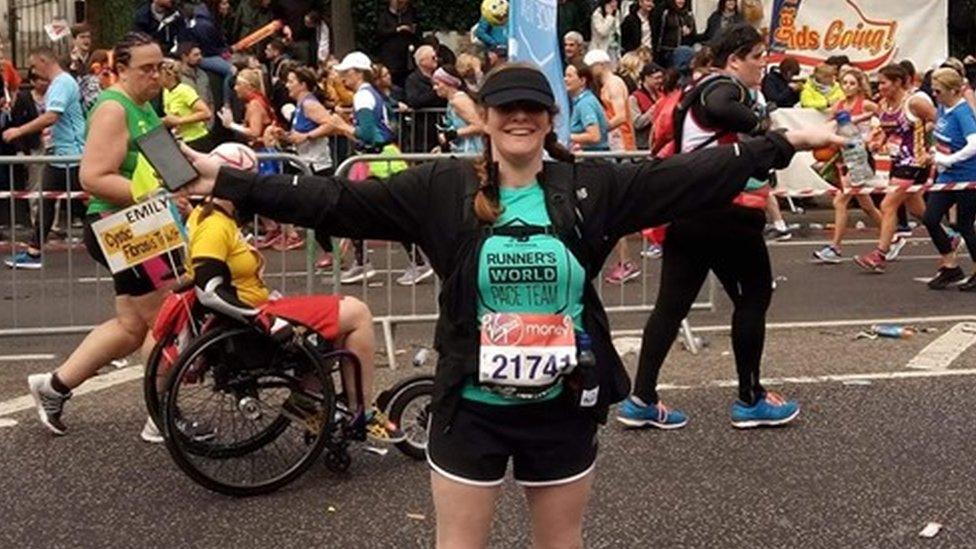
- Attribution
- Published3 April 2019

- Published20 April 2018
